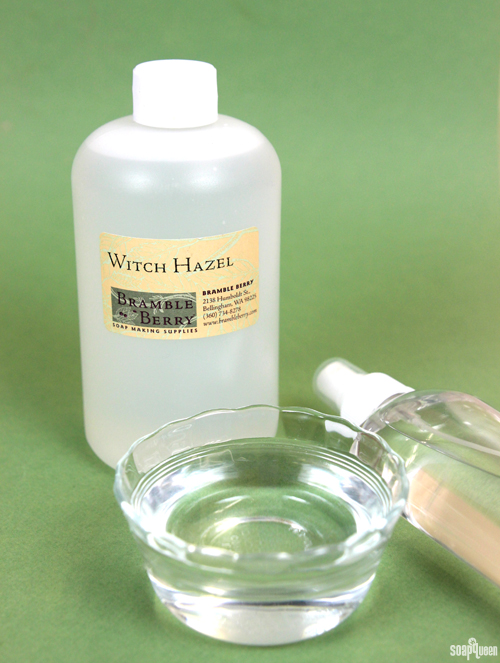Produced from the witch hazel shrub, witch hazel is a clear liquid that is often used as an astringent. The witch hazel shrub (genus: hamamelis) is a small plant that grows in North America, as well as Japan. Extracted from the leaves and bark of the North American variety (Hamamelis virginiana), witch hazel is fantastic for sensitive or dry skins because it is extremely gentle. Once the extract is obtained, water and alcohol are added for use. A clear liquid, witch hazel does have a unique, slightly sour odor.
Search Results for: sunday night spotlight
Sunday Night Spotlight: Orange Essential Oil
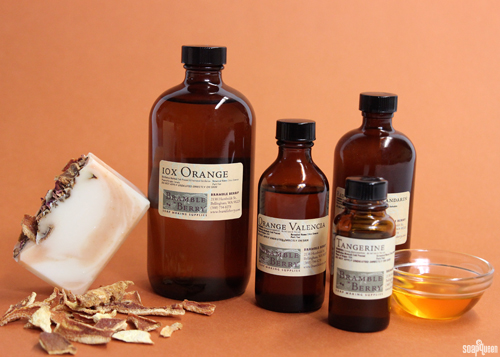 Produced from the peel of the orange fruit, orange essential oils are well known for their bright and fruity scents. Popular in a wide variety of projects, orange essential oil is commonly used in cleaning products. Bramble Berry carries four varieties of orange essential oil: Orange Valencia Essential Oil, 10X Orange Essential Oil, Red Brazilian Mandarin and Tangerine Essential Oil. All are fantastic, but have various properties that make them distinct.
Produced from the peel of the orange fruit, orange essential oils are well known for their bright and fruity scents. Popular in a wide variety of projects, orange essential oil is commonly used in cleaning products. Bramble Berry carries four varieties of orange essential oil: Orange Valencia Essential Oil, 10X Orange Essential Oil, Red Brazilian Mandarin and Tangerine Essential Oil. All are fantastic, but have various properties that make them distinct.
[Read more…]
Sunday Night Spotlight: Vitamin E Oil
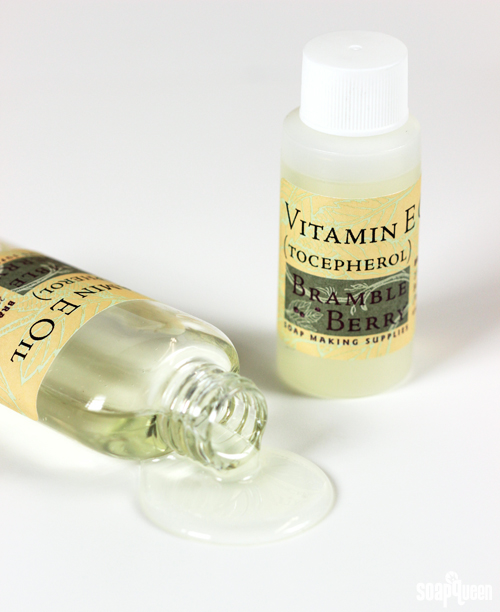 Easy to use in a wide variety of projects, vitamin E oil is a fat soluble antioxidant. Thick and rather sticky, vitamin E oil is great for use in lip balms, lotion, balms and soap. It is well known for its skin loving properties, including its ability to protect the skin from free radicals.
Easy to use in a wide variety of projects, vitamin E oil is a fat soluble antioxidant. Thick and rather sticky, vitamin E oil is great for use in lip balms, lotion, balms and soap. It is well known for its skin loving properties, including its ability to protect the skin from free radicals.
Sunday Night Spotlight: Loofah Sponges
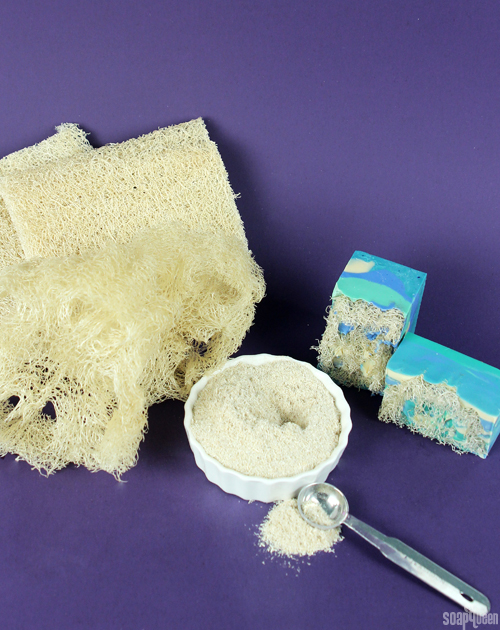 All natural loofah sponges provide excellent exfoliation to a wide variety of projects. Loofah sponges (Botanical Name: Luffa cylindrica) may come in the form of long tubes, shredded loofah and pre-cut loofah disks. These sponges can then be used in scrubs, melt and pour and cold process soap. Loofah sponges can also be used on their own to increase lather.
All natural loofah sponges provide excellent exfoliation to a wide variety of projects. Loofah sponges (Botanical Name: Luffa cylindrica) may come in the form of long tubes, shredded loofah and pre-cut loofah disks. These sponges can then be used in scrubs, melt and pour and cold process soap. Loofah sponges can also be used on their own to increase lather.
Loofah sponges come from the luffa plant, which is a member of the cucumber family. The luffa plant is often consumed as a vegetable when harvested while the large pods are still young. When the plant is allowed to mature, the skin and seeds are removed to reveal the loofah fiber. The loofah fiber is then washed to remove any leftover seeds and skin. Once the loofah fiber is completely clean, the fiber is dried out completely.
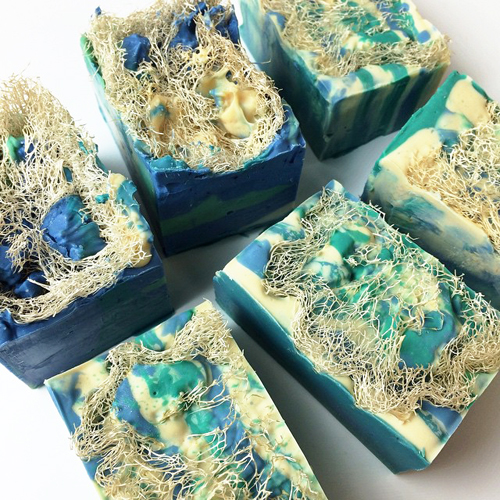 To use the flat loofah sponges, dunk the sponges in water to plump them up! You can then cut in the loofah sponges into the perfect size for your project. Or, cut them while flat and submerge in water after. When storing loofahs, keep them in a dry cool place away from excess moisture. If used in the shower, allow the loofah to hang dry after each use. Avoiding excess moisture eliminates possible bacteria and mold growth within the sponge.
To use the flat loofah sponges, dunk the sponges in water to plump them up! You can then cut in the loofah sponges into the perfect size for your project. Or, cut them while flat and submerge in water after. When storing loofahs, keep them in a dry cool place away from excess moisture. If used in the shower, allow the loofah to hang dry after each use. Avoiding excess moisture eliminates possible bacteria and mold growth within the sponge.
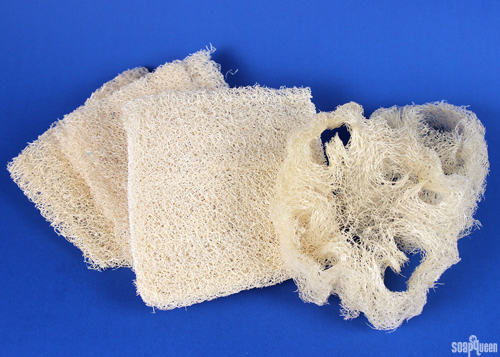
If you’re looking to incorporate loofah sponges into your next project, the Loofah Cold Process Soap Tutorial is a great recipe for the beginner soap maker. With shredded loofah, skin-loving fixed oil, and a crisp combination of Moroccan Mint and Moonlight Pomegranate Fragrance Oils, this soap leaves skin feeling incredibly fresh. If using loofah in cold process, the recommended usage rate is 1 tablespoon (or about 1/4 oz.) ground loofah per pound of soap.

In the Gardening Cold Process Soap, shredded loofah is sprinkled on top alongside jojoba beads to add extra scrubbiness. If you are unsure which exfoliant is right for your project, the Exfoliant Sampler Pack is a great way to experiment with shredded loofah and seven other scrubby options.
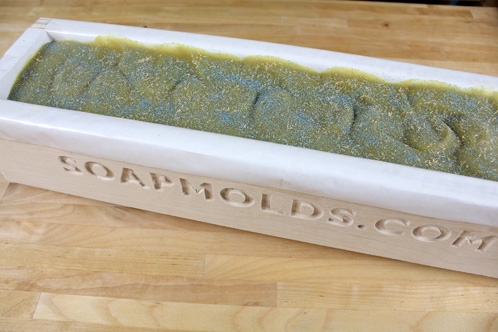
The Making Loofah Soap video on Soap Queen TV shows you how to incorporate the scrubby sponges into an adorable melt and pour project. First, shredded loofah is added into a colorful layered melt and pour project. Then, larger pieces of loofah sponges are embedded into individual melt and pour bars for a different look. The design possibilities with loofah sponges are extremely broad!
Sunday Night Spotlight: Sweet Almond Oil
Sweet Almond Oil is an incredibly versatile bath and beauty product. Excellent for use in scrubs, massage oils, cold process soap and lip balms, sweet almond oil is nearly odorless and light in color. It is great for a variety of skin types due to its lightweight texture and moisturizing ability.
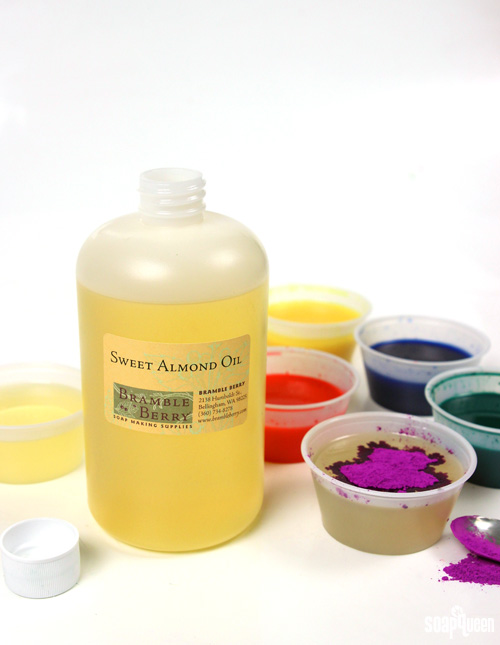 Sweet almond oil is produced by pressing the kernels of almond trees, and is known for its rich concentration of essential fatty acids. Sweet almond oil is produced from the same type of almonds you consume, and is full of vitamin A, E and B2. It has a shelf life of six to twelve months, and can be used in cold process soap up to 20%.
Sweet almond oil is produced by pressing the kernels of almond trees, and is known for its rich concentration of essential fatty acids. Sweet almond oil is produced from the same type of almonds you consume, and is full of vitamin A, E and B2. It has a shelf life of six to twelve months, and can be used in cold process soap up to 20%.
Sunday Night Spotlight: Sodium Lactate
The hardest part of making soap is often waiting to unmold it to see the finished product. Luckily, there is an easy way to cut down the wait time. Sodium lactate is a liquid salt that can be added to cooled lye water in order to speed up unmolding time. Using sodium lactate produces harder, longer-lasting bars of cold process soap.
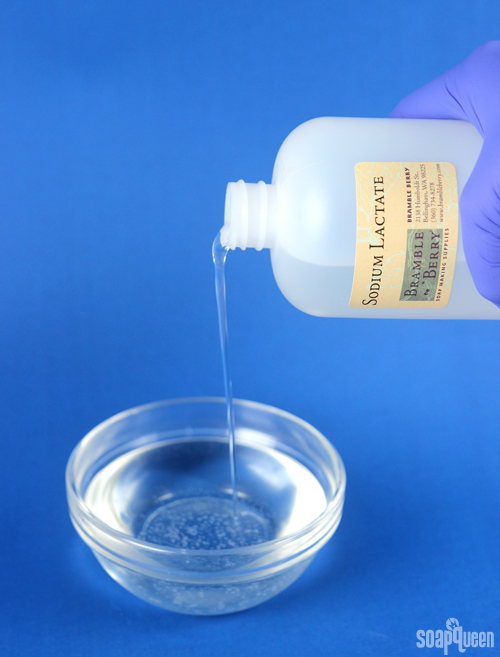 Derived from the natural fermentation of sugars found in corn and beets, sodium lactate is the sodium salt of lactic acid. Naturally a liquid product, sodium lactate is also available in powder form. Sodium lactate is commonly used in food products as a preservative. It’s also an extremely effective humectant, helping to strengthen the skin moisture barrier.
Derived from the natural fermentation of sugars found in corn and beets, sodium lactate is the sodium salt of lactic acid. Naturally a liquid product, sodium lactate is also available in powder form. Sodium lactate is commonly used in food products as a preservative. It’s also an extremely effective humectant, helping to strengthen the skin moisture barrier.
[Read more…]
Sunday Night Spotlight: Jojoba Beads
Looking to add gentle exfoliation and a pop of color to your next project? Small, spherical jojoba beads are a great option. Created from jojoba oil, jojoba beads (sometimes referred to as jojoba esters) are odorless, firm and come in a various colors and sizes. Jojoba beads can be used in various projects including melt and pour, scrubs and cold process.
 Love the cheery orange color of jojoba bead shown above? This new color will be available soon!
Love the cheery orange color of jojoba bead shown above? This new color will be available soon!
Jojoba oil is a luxurious liquid wax derived from the seed of the Jojoba shrub. Jojoba oil is made of up various long chain molecules. These molecules are transformed from a liquid to a solid wax by processes called hydrogenation or transesterification. This firm wax is referred to a jojoba ester, also known as a jojoba bead!
Sunday Night Spotlight: 99% Isopropyl Alcohol
When making both cold process and melt and pour soap, a spray bottle of 99% Isopropyl Alcohol is helpful. Also known as rubbing alcohol, isopropyl alcohol helps to prevent soda ash on cold process soap, and helps layers stick together when working with melt and pour. It is also helpful to have on hand to clean up messy surfaces after making projects!
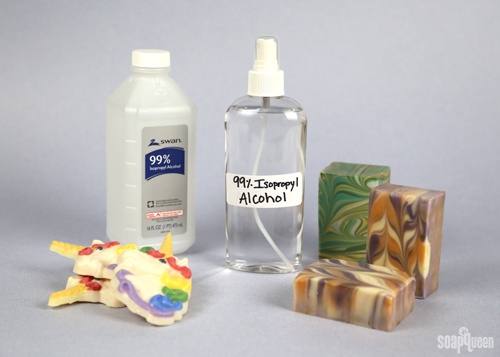 The two most common types of alcohol are isopropyl alcohol and ethyl alcohol. The basic difference between the two is that ethyl alcohol is commonly used for consumption, while isopropyl alcohol is used for topical application. Isopropyl alcohol is not safe for consumption.
The two most common types of alcohol are isopropyl alcohol and ethyl alcohol. The basic difference between the two is that ethyl alcohol is commonly used for consumption, while isopropyl alcohol is used for topical application. Isopropyl alcohol is not safe for consumption.
[Read more…]
Sunday Night Spotlight: Foaming Bath Whip + Green Tea Shaving Cream Tutorial
Light and creamy, Foaming Bath Whip is a product that can be used in many different projects. From scrubs, bath bombs and soapy frosting, this versatile whip adds a fluffy texture and moisture. The main ingredient is glycerin, which attracts moisture from the air and leaves your skin feeling hydrated.
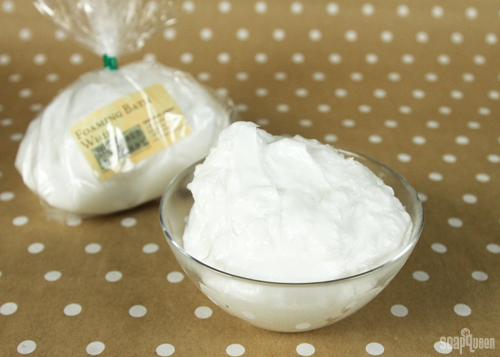
Easy to customize, Foaming Bath Whip will accept up to 5% fragrance or essential oils. Simply pour the fragrance in, and use a hand mixer or stick blender to beat the Foaming Bath Whip to achieve a soufflé-like consistency. Very mild with a pH level of 5.5, this product is ideal for dry or sensitive skin. Looking for even more moisture and skin loving properties? Extracts and fixed oils can also be added to Foaming Bath Whip.
[Read more…]
Sunday Night Spotlight: Jojoba Oil
When you’re formulating for anything skincare, there are a wide variety of oils available. One that is a favorite for skincare is jojoba oil; it acts somewhere between an oil and a liquid wax, jojoba oil is a versatile ingredient that can instantly enhance any bath & beauty product. Pronounced “ho-ho-ba,” this oil joins the ranks of Chia and Argan oils as a fast absorbing, super-skin nourishing oil.

Jojoba oil is extracted from the seed of the Jojoba shrub. The shrub is native to southern Arizona, California and northwestern Mexico. In it’s natural state jojoba oil is a thick, light golden liquid with a slightly nutty odor. It has an extremely long shelf-life because it does not contain triglycerides (basically fats) like other oils do. In fact, according to the Alternative Field Crops Manual, jojoba oil is “relatively pure, non-toxic, biodegradable, and resistant to rancidity.” These qualities make it an excellent, hardy option for massage oils, lotions and cold process soaps. Technically, because jojoba oil is actually a liquid wax, the shelf life is long-lasting (decades even). Even being a liquid wax, the oil has similar properties to skin, making it a light-weight, easily-absorbable skincare option.

Due to its versatility, indefinite shelf life and nourishing properties, jojoba oil has been used in a wide variety of soapy projects on the Soap Queen blog. You can use varying amounts of jojoba oil in scrubs, lotions or lip balms, but it shouldn’t be used more than 10% in cold process soap because it tends to weigh down lather. Below are just a few projects where we’ve used jojoba oil:

Top: Mango Avocado Balmy Salve, Loofah Cold Process
Middle: Radiant Red Lipstick, Mini Heart Bath Bombs
Bottom: Massage Oil, Cuticle Oil
Have you made products using jojoba oil? What did you think? Leave a review on the product’s page to let other crafters know what you thought!
Sunday Night Spotlight: Peppermint Essential Oil
Sure it may remind you of Christmas and candy canes, but peppermint essential oils shouldn’t be limited to holiday-themed projects. Bramble Berry carries two types of peppermint essential oils, and while their differences are subtle, they can be important! Read on to learn more about both kinds of peppermint essential oil and how you can use them in a wide variety of projects.

Sunday Night Spotlight: 10″ Silicone Mold
It’s always fun to experiment with new molds, fragrances and designs, but at the end of the day every soaper has their own tried and true recipe and go-to set of soapy tools. In the Soap Lab, our foolproof toolkit is anchored around the 10″ Silicone Loaf Mold.
![]()
The 10″ Silicone Loaf Mold in action!
Sunday Night Spotlight: Extracts
Sometimes a good bar of soap needs a little something special to take it from being a good bar to a positively super-spectacular-bar-of-awesomeness. While there is plenty to add to soap, from exfoliants to exotic oils, extracts are our secret weapon of choice to create a truly amazing bar of soap.

Bramble Berry carries 14 different extracts. There is much more where this came from.
Sunday Night Spotlight: Oats
There’s a reason mom ran you an oatmeal bath when you had childhood skin issues: time and again oats have been proven as gentle and effective for soothing irritated skin.
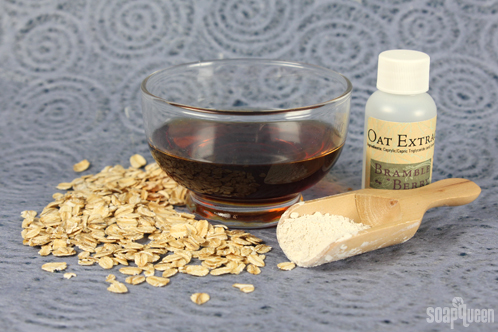
Left to right: rolled oats, Hydrolyzed Oats, Oat Extract, Colloidal Oatmeal
